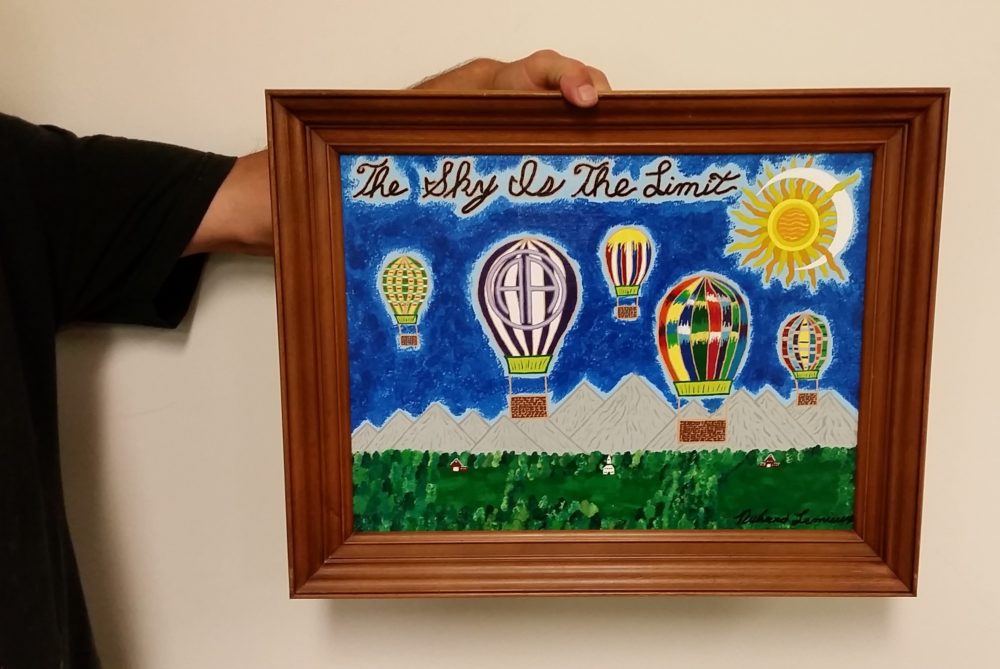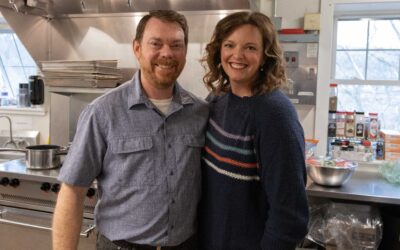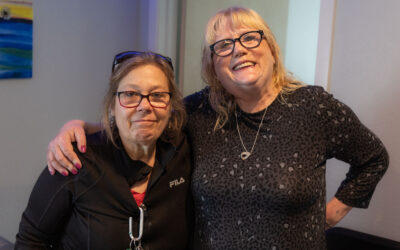Surviving Alcoholism

Russell enters the room with a warm greeting, slowly but steadily making his way to the table. He is slightly off-balance, but seems confident. You wouldn’t guess that he had a major surgery on his cervical spine in April 2017; you also wouldn’t know that until 11 months and eight days* ago, he’d been drinking in excess for 30 of his 45 years.
In August of 2016, Russell’s life looked very different from today: he lived in Nashua, was homeless, had no job, and could barely walk. He was falling quite frequently, but attributed it to his dependence on alcohol—at the time, he could barely wait an hour for another drink. Russell contacted his parents when he knew something was seriously wrong. He went to stay with them and just a few days after his arrival, with the falls continuing, his mother brought him to the hospital. The doctor questioned him about his drinking, but he hadn’t had a drink in two to three days. Shortly after that conversation, the doctor would put Russell into a medically-induced coma for his own health: he was in such poor shape that his body was failing.
Russell says that being in a coma and not going through DTs (Delirium Tremens—a severe form of withdrawals after drinking heavily for an extended period) was both a blessing and a curse. Sometimes going through that pain can be a better reminder not to relapse. However, when he got out of the coma, he was ready, not nervous, to move forward into rehab. His biggest fear was that he wouldn’t be received into a program due to his physical condition. The coma had helped him progress temporarily, but his balance was still not right and his body was worn down. While he was thankful to find a spot at the Friendship House in Bethlehem, NH where he could live and begin to address his alcoholism, there was still the logistical matter of needing to see his doctors in Nashua.
Though difficult, Russell continued trips south to the doctors and had an MRI in December 2016. His doctor called to tell him that it was urgent for him to return to Nashua for the results. Once at the doctor’s office, Russell learned that he had extensive nerve damage in his spine and would require a significant surgery; without it, he would likely be in a wheelchair within a matter of years. To complicate matters, Russell’s time in Bethlehem was almost up—he’d been with them for nearly four months. He started his search for where to go next and found Headrest in Lebanon, NH who said they might have a bed available soon. Two weeks later, he got the call: a bed was available at Headrest, but they wouldn’t be able to hold it for him. His need for surgery was looming, but finding shelter and continuing his treatment for alcoholism was a priority. He took the bed in the Upper Valley.
Fortunately, Russell told his doctor in Nashua where he’d be staying and things took a turn for the better—they could transfer his paperwork to nearby Dartmouth-Hitchcock Medical Center and DHMC had specialists who could perform Russell’s surgery. He went on to have the major surgery in early April, spending a week at DHMC, then being transferred to a rehabilitation hospital in Concord for two to three weeks. Drinking heavily daily and not taking care of himself had done permanent nerve damage to Russell’s spine. The surgeon fused his third through seventh vertebrae and put metal plates in his neck. He had to learn to walk again. He notes that we take a lot of things for granted and walking is one of them. Getting up and down too—just the other day, for example, he laid down in the grass in the sun for a few minutes, then realized he wasn’t sure how he’d get back up.
Now back in the Upper Valley and a resident of the Haven for about a month, Russell is grateful for the resources and the people he has met in this area. He sees a stark contrast to where he used to live and the people he used to spend time with, saying, “I feel at home with people I’ve just met.” He wasn’t used to meeting new people, having always spent time with the same individuals—now he likes having conversations with lots of new people from other guests to staff to community members. He feels comfortable talking in front of a crowd and sharing his story. “I feel better about myself. I just feel alive, it feels awesome.” He’s quick to temper that sentiment though, knowing that he doesn’t want to get a “big head” about his progress; alcoholism is a chronic disorder and in the process of recovery he is currently in remission.
One of Russell’s proudest moments came a few weeks ago, when his parents visited him for dinner. It was the first time he’d seen his father since living with them temporarily in August 2016. At dinner, Russell’s dad told him he didn’t go to the hospital after the surgery because he didn’t think his son would succeed. He worried he’d be setting himself up for disappointment since Russell would likely return to drinking and living with his parents. Instead, he is very proud of his son.
While at the Haven, Russell continues weekly visits with an outpatient counselor at Headrest. He focuses on strength training in his hips and lower back at the CCBA in Lebanon with a membership through the Good Neighbor Health Clinic and is starting to receive dental services. He speaks highly of the impact that Alcoholics Anonymous has had on him and enjoys his Getting Ahead adult education class at the Haven, especially as he narrows down where he’d like to live in the future. He also shares, “I highly recommend the Haven for help with anything, not just shelter-wise. The family department is incredible. There are people gardening and making the place look welcoming all the time—you don’t see that in the city. I even saw volunteers painting the walls today.”
Looking ahead to his next goals, Russell’s main concern is mobility—his own after surgery and obtaining a driver’s license. “Thank God for the bus here!” The Upper Valley appeals to him (somewhere away from the city) but rural transportation has its challenges. In addition to continuing to build his strength, he hopes to find a job, perhaps getting into property maintenance for his friend to start. He likes his newfound confidence, but doesn’t take it for granted and aims to heed the advice of his sponsor to not let it get to his head early in his treatment and recovery process that will endure for his lifetime. In the meantime, Russell has taken up painting as a relaxing hobby. He shows me his first completed painting from a makeshift painting studio in the Ives Library of Hixon House—it’s colorful, hopeful, and impressive. Above a field of hot air balloons reads in script lettering: “The Sky Is The Limit.” You can tell he believes it.
*As of August 22, 2017


